Chapter 2 of the Maharashtra Regional and Town Planning Act, 1966 (MRTP act 1966) deals with the establishment of planning authorities and their functions. The chapter provides provisions for the constitution, powers, and functions of various planning authorities responsible for regional planning, town planning, and development control in Maharashtra.
PROVISIONS RELATING TO REGIONAL PLANS
Section-3. Establishment of Region and alteration of its limits:
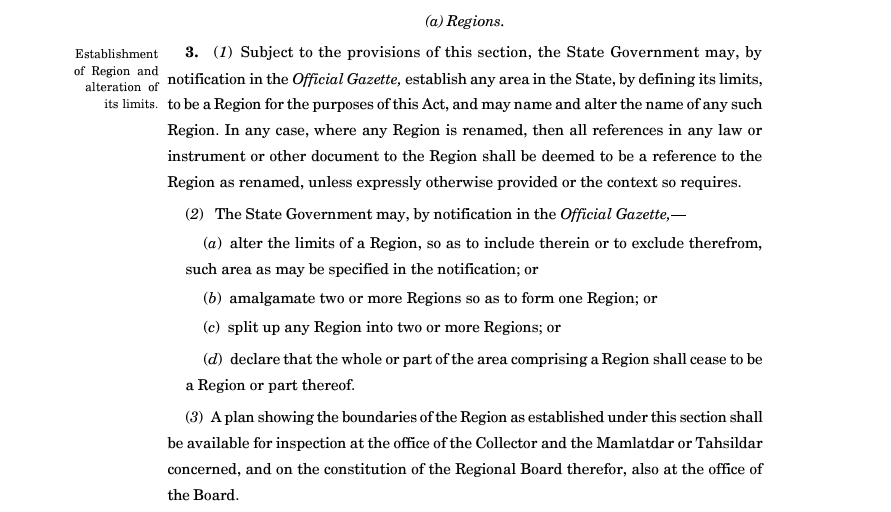
The Bombay Town Planning Act was enacted in 1954 and was extended to the whole state of Maharashtra, excluding the City of Nagpur. The act mandated that every local authority within the state must carry out a survey of the area within its jurisdiction. The purpose of the survey was to gather information about the existing land use, population, infrastructure, and other relevant factors that would inform the development of a comprehensive development plan.
Once the survey was completed, the local authority was required to prepare and publish a Development Plan for its jurisdiction. The Development Plan would be a comprehensive document that outlines the proposed development or redevelopment of the area within the local authority’s jurisdiction. The plan would take into account various factors such as population growth, infrastructure requirements, and environmental concerns.
The local authority was required to submit the Development Plan to the State Government for sanction within four years after the act came into force. Sanction from the State Government was necessary for the plan to be legally binding and enforceable.
The primary objective of the Bombay Town Planning Act was to ensure the orderly and planned development of urban areas in the state of Maharashtra. By mandating the preparation of a Development Plan, the act sought to ensure that development and growth in the state was guided by a comprehensive and well-thought-out plan that took into account the needs and aspirations of the people as well as the broader social and economic context.
Section-4. Constitution of Regional Planning Boards-
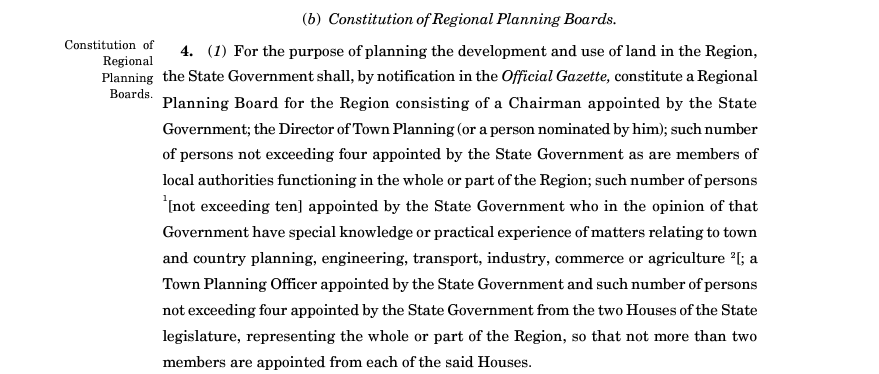
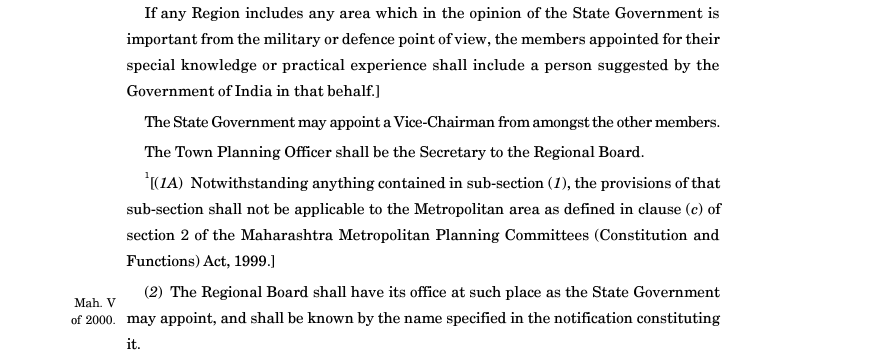
The Regional Planning Board is a body constituted by the State Government of Maharashtra for the purpose of regional planning. The Board is responsible for formulating and implementing regional plans that address issues related to urban and rural development, infrastructure, transportation, and other related matters.
The composition of the Regional Planning Board is specified in the Maharashtra Regional and Town Planning Act, 1966. The Board is headed by a Chairman appointed by the State Government. The Director of Town Planning or a person nominated by him is also a member of the Board. In addition, the Board comprises members of local authorities functioning in the whole or part of the region.
The State Government also appoints up to four members who have special knowledge or practical experience in matters relating to town and country planning, engineering, transport, industry, commerce or agriculture. The Vice-Chairman of the Board is also appointed by the State Government.
The primary function of the Regional Planning Board is to prepare and implement regional plans that are consistent with the overall development objectives of the State Government. The Board is responsible for ensuring that development in the region is carried out in a planned and sustainable manner, taking into account factors such as population growth, infrastructure requirements, environmental concerns, and economic development.
In summary, the Regional Planning Board is a key institution in the planning and development of regions in the state of Maharashtra. Its mandate is to ensure that development is carried out in a sustainable and coordinated manner, and that the interests of all stakeholders are taken into account.
The Regional Planning Board, as constituted by the State Government, is responsible for preparing and executing Regional Plans for the development of a particular region. However, before executing any Regional Plan, it is important for the members of the Board to take into consideration the existing infrastructure as well as the necessary future development required for the region. This ensures that the Regional Plan is in line with the current and future needs of the region.
However, in the case of a metropolitan area, the Regional Plan prepared by the Regional Board will not be taken into consideration. This was observed in the case of Eknath s/o Punjaji Nawale v/s. State of Maharashtra, 2012(5) Mh.L.J 94. The court held that the provisions of the Maharashtra Regional and Town Planning Act, 1966, do not apply to a metropolitan area since the metropolitan region has its own planning authority. Therefore, the Regional Plan prepared by the Regional Board cannot be enforced in a metropolitan area.
Section-5. Terms of office and conditions of service of members-
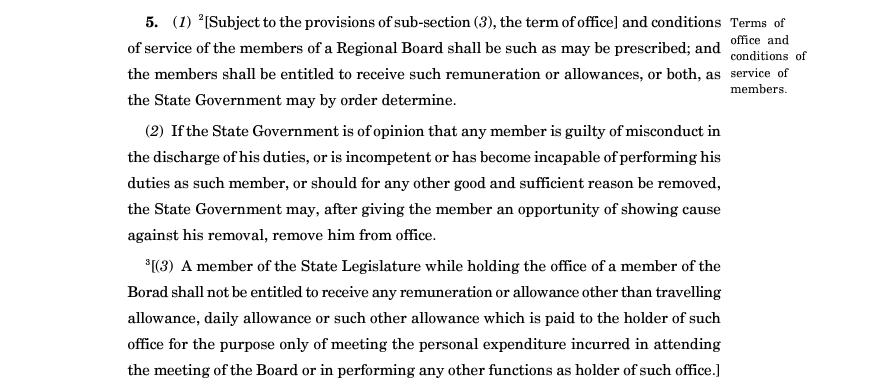
The Maharashtra Regional and Town Planning Act, 1966 provides for the constitution of Regional Planning Boards to prepare and implement regional plans for the development of areas within their jurisdiction. The Act lays down the term of office and conditions of service of members of the Regional Planning Board.
According to the Act, members of the Regional Board shall hold office for a period of two years from the date of notification under subsection (1) of section 4. However, the State Government has the power to extend the term of the Board, on the Board’s request, for a period of twelve months at a time, but in no case exceeding three years in aggregate.
The Act also prescribes the remuneration of members of the Regional Board. They shall be paid such fees and allowances as may be determined by the State Government, in consultation with the Board. The Act also provides for the removal of members of the Board in certain circumstances, such as misconduct or neglect of duties.
Under the Maharashtra Regional Town Planning Act, 1966, if any member of the Regional Planning Board is found to be guilty of misconduct in the performance of his or her duties, or is found to be incompatible with the performance of his or her duties, the State Government may serve a show cause notice to such member. This notice will specify a particular time period and offer an opportunity to the member to present his or her say on the matter. If the explanation given by the member does not satisfy the State Government, then it may remove such member from the office. This provision is in place to ensure that the members of the Regional Planning Board carry out their duties in a responsible and ethical manner, and that the interests of the public are protected.
According to the Maharashtra Regional Town Planning Act, 1966, a member of the State Legislature who is also a member of a Regional Planning Board is not entitled to any remuneration or allowances other than traveling allowance or such other allowance which is paid to the holder of such office for the purpose only of meeting the personal expenditure incurred in attending the meeting of the board or in performing any other function as the holder of such office.
This means that if a member of the State Legislature is also appointed as a member of the Regional Planning Board, they cannot receive any additional remuneration or allowances other than the traveling allowance or such other allowance which is paid to the holder of such office for meeting the personal expenditure incurred in attending the meeting of the board or performing any other function as the holder of such office.
This provision was added to the Maharashtra Regional Town Planning Act, 1966, by amendment under section 2 (b) of Mah. Act. No. 24 of 1968/ L.A 39 of 1968
The case of Patel Kantilal Muljidas and Ors. v. State of Gujarat And Ors. pertains to the power of removal of an appointed officer by the State Government. In this case, it was held that the State Government has the power of removal of an appointed officer only if he has been guilty of misconduct in the discharge of his duties or has shown disgraceful conduct in respect of his official duties or if he is incapable of performing his duties.
This means that the State Government cannot remove an appointed officer arbitrarily or for any other reasons except for those mentioned above. The power of removal must be exercised in accordance with the law and the principles of natural justice, which includes giving the officer an opportunity to explain his conduct before any decision to remove him is taken.
The excerpt refers to a previous court case, Chimanbhai Patel v. State of Gujarat, where the court had to interpret Section 37 of an Act. In the current case, the court is dealing with a similar situation and refers to the previous case. The Division Bench in the previous case had observed that the position of the Chairman of the Committee (in that case, the Dispensary Committee) is distinct from that of the councillors of the municipality. The court in the current case is relying on this observation and the interpretation of Section 37 by the Division Bench in the previous case to come to a decision. The context and details of the current case are not provided in the given excerpt.
Also Read: https://legalreferencer.in/mrtp-act-1966/
Also Read: https://legalreferencer.in/martp-act-1966/
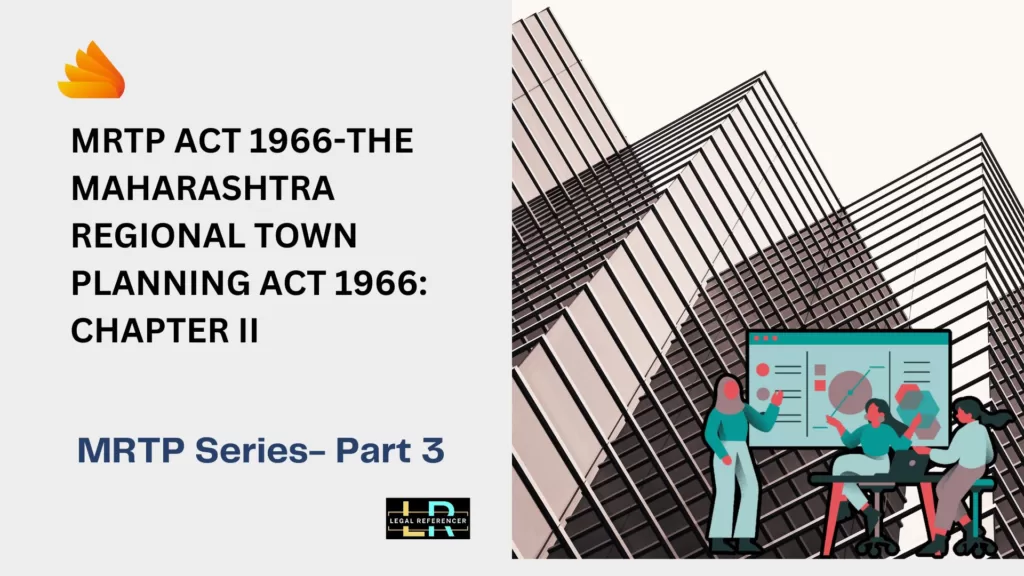
Section-6. Resignation of members–

Any member of a Regional Board may at any time resign his office by writing under his hand addressed to the State Government, and upon the acceptance thereof, the office of the member shall become vacant.
Section-7. Vacancies–

The provision being referred to here is related to the term of office of a member of the Regional Planning Board under the Maharashtra Regional and Town Planning Act, 1966. As per the Act, the members of the Board hold office for a period of two years from the notification under section 4(1) of the Act. However, if the Board requests an extension of their term, the State Government can extend their tenure for a period of twelve months at a time, but not exceeding a total of three years in aggregate.
In the case of Akbarali Kasamali Ravjani v. N.G. Pandya And Anr., the court held that if a member is removed from the office on account of resignation, the period of the new member appointed in their place shall include the remaining period of the previous member’s tenure. This means that the total tenure of the new member will be the remaining tenure of the previous member plus their own tenure as a member of the Board.
Section -8. Powers and duties of Board–
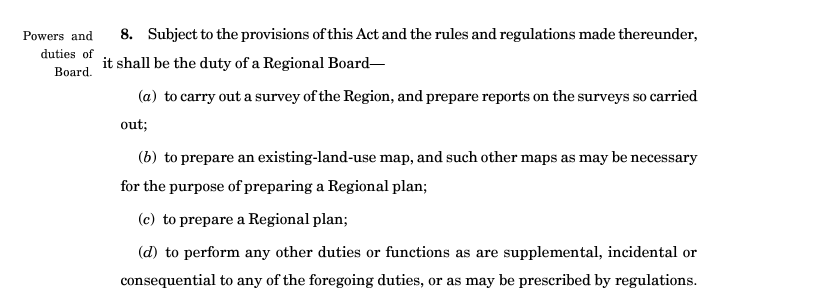
Under the Maharashtra Regional Town Planning Act, 1966, the preparation of a Development Plan for a region is a crucial step in ensuring planned growth and development. Before beginning the preparation of the Development Plan, a survey of the region is carried out by the Regional Planning Board. The survey helps in identifying the existing land use pattern, natural resources, and infrastructure facilities in the region. Based on the survey, the Board prepares a land use map, which serves as a base for the preparation of the Development Plan. This map provides an overview of the current land use pattern, including residential, commercial, industrial, and recreational areas. It helps in identifying areas that need development, conservation, or redevelopment.
As per the Maharashtra Regional and Town Planning Act, 1966, the Regional Plan is an important document that consists of various charts, maps, and written information about a particular region. One of the key components of the Regional Plan is the index map, which provides a broad overview of the region and its key features. The Act specifies that the scale of the index map should not be smaller than ten centimeters and not larger than fifty kilometers. This ensures that the index map provides an accurate and comprehensive overview of the region while still being easy to read and understand. The other charts, maps, and documents included in the Regional Plan provide detailed information about the land use, infrastructure, and development potential of the region.
According to the Maharashtra Regional Town Planning Act, 1966, the Regional Board has the power to appoint officers and staff as needed for the preparation and execution of the Regional Plan. The expenses incurred for these purposes shall be met from the funds placed at the disposal of the Board. The Board can also delegate its powers to any officer appointed by it for the purpose of executing the provisions of the Act. The officers appointed by the Regional Board have the responsibility of maintaining records and performing duties under this section. The Act further states that the Board may also appoint consultants and experts to assist in carrying out its functions.
Section- 9. Meetings of Regional Board, etc-
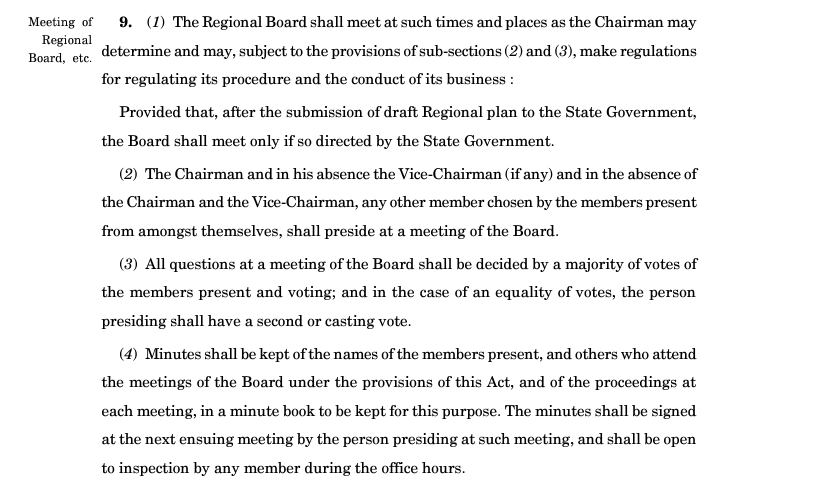
According to Section 4 (2) of the Maharashtra Regional Town Planning Act, 1966, the meetings of the Regional Board will be held at the office notified by the State Government. However, in case of site inspection of the proposed regional plan or for any other reason, the Chairman of the Board may determine the place of the meeting. The notice for the meeting shall be served to all the members of the Board so that they can remain present. The notice shall include the subject of the meeting, place of meeting, date of meeting, and any other relevant information. The Board shall discuss and take decisions on various matters related to regional planning, including the preparation and modification of the Regional Plan, acquisition of land for public purposes, and proposals for development in the region. The decisions taken by the Board shall be recorded in the minutes of the meeting, and the Secretary shall prepare a report on the decisions taken and submit it to the State Government. The meetings of the Board are usually chaired by the Chairman. However, if he is absent, the Vice-Chairman shall preside over the meeting. If both are absent, any other member of the Board, chosen by all present members, can act as Chairman and preside over the meeting. In this case, the Chairman shall have a deciding or casting vote in case of equality of votes.
Under the Maharashtra Regional Town Planning Act, 1966, the decisions made in a meeting of the Regional Board are based on the majority votes of the members present. In case of a tie, the person presiding over the meeting, whether it’s the Chairman, Vice-Chairman or another member chosen amongst themselves, has the right to cast a second vote. The basis for this second vote is immaterial and not specified in the Act. It is assumed that the person presiding over the meeting will cast his second vote based on his own judgment, experience, and knowledge of the subject matter being discussed. The purpose of this provision is to ensure that decisions are made by the majority and that the meeting is not stalled due to a tie.
Under the Maharashtra Regional Town Planning Act, 1966, the Regional Board is required to maintain a minute book that contains details of the names of the members present in the meeting, as well as the names and details of any other persons who may be appointed by the Chairman or Secretary to assist or advise the Board. The purpose for which these persons are appointed or associated with the Board must also be recorded. Additionally, the minute book should include the proceedings of each meeting held by the Board. The maintenance of such minute books is essential for recording and preserving the decisions and discussions held by the Regional Board, and serves as an important reference for future planning and decision-making processes.
The development plan is a crucial document as it provides a roadmap for the planned development of a region. As mentioned in the section, before preparing the development plan, a survey of the region must be carried out, and an existing land use map must be prepared by the Regional Board.
However, the preparation of the development plan is not a one-time process, and several issues may arise during its preparation. These issues could relate to technical aspects or objections and suggestions raised by project affected persons. To address these issues, meetings of the Regional Board become necessary. The meetings provide a platform for the officials to discuss and resolve the issues faced during the preparation of the development plan.
As per Section 4(2) of the Act, the meetings shall take place at the office notified by the State Government. The Board is expected to take technical and other guidance from the State Government to ensure that the development plan is prepared in line with the overall objectives of the State. Moreover, it is essential that the minutes of the meetings are maintained by the Board, which should include the names of the members, details of other persons appointed to assist or advise the Board, and proceedings of each meeting.
Section -10. Consultation or association with experts; Regional Planning Committee–


It is the responsibility of the State Government to ensure the applicability of every plan and scheme prepared for the region. Therefore, it is mandatory for the authorities assisting the State Government to seek previous sanction at every stage of the planning process. The Regional Board has the duty to prepare the Development Plan and submit it to the State Government for their approval. The approval from the State Government is necessary before implementing any plan or scheme in the region. Moreover, the authorities assisting the State Government are entitled to receive remuneration for their services. The amount of remuneration will be fixed by the State Government.
In accordance with Rule 5 of the Maharashtra Development Plans Rules, 1970, the Town Planning Officer serves as both the secretary of the Regional Board and a member of the Regional Planning Committee. The minimum qualifications for the Town Planning Officer are also outlined in this Rule, which specifies that the officer must hold a degree in Town Planning and Estate Management or in Civil Engineering or Architecture from a university recognized by the State Government.
The some of the tasks of the Regional Board are as follows:
a) Conduct a survey of the Region and prepare a report on it.
b) Prepare an existing land use map and other maps necessary for the preparation of the Regional Plan.
c) Collect all necessary documents related to the Regional Plans and prepare the Regional Plan.
d) Issue a public notice inviting objections and suggestions from those likely to be affected by the Draft Development Plan.
e) Appoint a Regional Committee to hear objections and suggestions.
f) Make copies of the Regional Plan available to the public for inspection at a reasonable price.
According to section 4 (1) of the Act, the Town Planning Officer serves as both the Secretary of the Regional Board and a mandatory member of the Regional Planning Committee. Due to their technical expertise and qualifications in the field of Town Planning, the presence of the Town Planning Officer is essential when addressing objections and suggestions from affected parties. The committee is composed of the Town Planning Officer and two additional members selected from the Regional Board by the Chairman.
The Regional Planning Committee members are eligible to receive allowances for their travel and daily expenses. The Town Planning Officer and any member who is a government servant may claim travel and allowances as per their official duties and their grade under the Bombay Civil Service Rules, 1959. Non-official members, on the other hand, will receive travel and daily allowances according to the rules specified in section 1 of Appendix XLII-A to the Bombay Civil Service Rules, 1959.
Section-11. Power of Regional Board to appoint staff–


Section- 12. Expenses of Regional Board–

According to section 12 of the Maharashtra Regional Town Planning Act, 1966, all expenses incurred by a Regional Board must be met from funds provided by the State Government. These expenses include salaries, allowances, fees, and other remuneration payable to the Board’s members, officers, and staff, excluding salaried government officers or staff.
The Regional Board’s financial responsibilities are significant, given the range of tasks it must perform. These responsibilities include conducting surveys of the region, preparing reports, preparing development plans, issuing public notices for inviting objections and suggestions, and appointing regional committees to hear objections and suggestions. All these activities require a significant amount of money to be spent on administrative and technical aspects.
The Act also provides for the maintenance of proper accounts and records of all transactions related to the expenses incurred by the Regional Board. The accounts must be audited annually by the State Government, and the Board must submit a copy of the audited accounts to the State Government. This provision ensures that the Regional Board’s expenditure is transparent and accountable.
Section- 13. Survey of region and preparation of Regional Plan–

The Maharashtra Regional and Town Planning Act aim to regulate the development and land use of the region. Its primary objective is to prepare a well-organized plan for the development of the region and execute it effectively. The plan should allocate land appropriately to make sure that the new town is appropriately organized. After the plan is prepared, it needs to be implemented through compulsory land acquisition and other connected matters. The Regional Board is responsible for carrying out the acquisition process as per the provisions of the Act.
The Act also provides guidelines for the preparation and execution of the Regional Plan. The plan should be implemented in accordance with the provisions of the Act. The Regional Board is expected to execute the plan by following the guidelines and regulations of the Act. The ultimate goal is to ensure that the region’s development is properly planned, and land use is optimized.
The Regional Board shall prepare a Draft Regional Plan based on the existing land use map, and may incorporate the objectives listed in Section 14 of this Act, which include:
(a) the allocation of land for various purposes, the general distribution and location of land, and the extent to which it may be used for residential, industrial, agricultural, forest, or mineral exploitation purposes;
(b) the reservation of areas for open spaces, gardens, recreation, zoological gardens, natural reserves, animal sanctuaries, dairies, and health resorts;
(c) transportation and communication, such as roads, highways, railways, waterways, canals, and airports, including their development;
(d) water supply, drainage, sewerage, sewage disposal, and other public utilities, amenities, and services, including electricity and gas;
(e) the reservation of sites for new towns, industrial estates, and any other large-scale development or project required for the proper development of the Region or new town.
Section -14. Contents of Regional Plan–
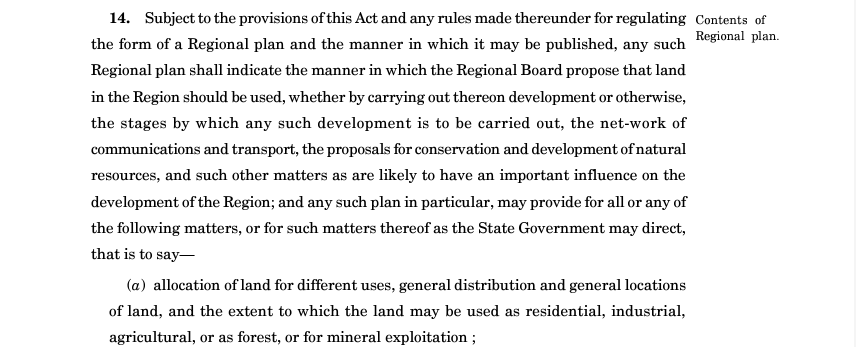

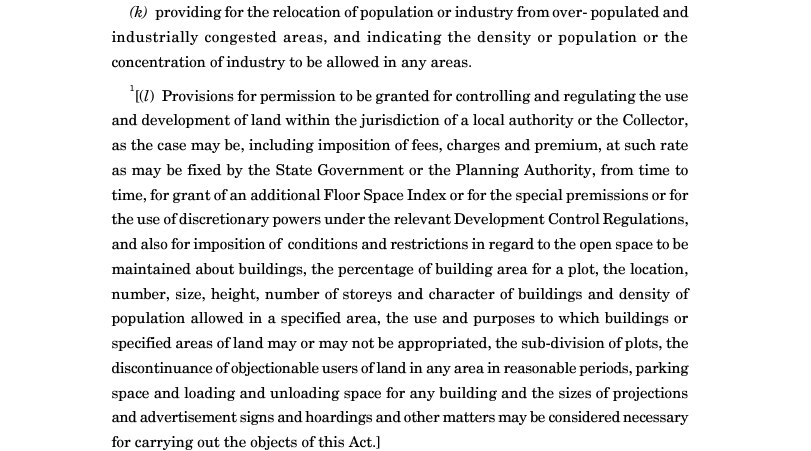
The Regional Plan is a crucial aspect of the Maharashtra Regional and Town Planning Act, as it outlines the proposed use of land in the region and the stages by which development will be carried out. The plan must be prepared by the Regional Board in accordance with the Act’s provisions and published according to its rules. The Regional Plan should cover various areas, including the allocation of land for different purposes, the location and distribution of land, and the extent to which it can be used for residential, industrial, agricultural, forestry, or mineral exploitation. Additionally, it should include provisions for open spaces, gardens, zoos, nature reserves, and other areas of conservation and development. The plan should also address transportation and communication networks, water supply and drainage, sewage disposal, public utilities, and amenities, including electricity and gas. It should provide for the preservation, conservation, and development of natural resources, as well as areas of historical or educational interest. The Regional Plan should also consider areas required for military and defence purposes, and address prevention of erosion, afforestation, reforestation, and flood control. The plan may also include proposals for irrigation, water supply and hydro-electric works, and relocation of population or industry from overpopulated or congested areas. Finally, it should provide for controlling and regulating the use and development of land within the jurisdiction of local authorities or Collectors, including imposition of fees, charges, and premiums for granting additional Floor Space Index or special permission, and the imposition of conditions and restrictions for maintaining open spaces and regulating the size, height, and density of buildings.
The Regional Plan is a document that outlines how land in a particular region should be used, either for development or conservation, and it sets out the stages by which any such development should be carried out. The plan also covers a range of other important matters that could impact the development of the region, such as transportation networks, conservation and development of natural resources, and the provision of public utilities and amenities.
The contents of a Regional Plan are subject to the provisions of the Act that governs its creation, as well as any rules made under that Act. The Act specifies that the Regional Plan must include a broad range of topics, such as the allocation of land for different uses, including residential, industrial, agricultural, forest, and mineral exploitation. It must also include the general distribution and location of land, as well as the extent to which it may be used for each of these purposes.
The Regional Plan must also take into account the need to preserve open spaces, gardens, recreation areas, zoological gardens, nature reserves, animal sanctuaries, dairies, and health resorts. In addition, it must cover transportation and communications infrastructure, including roads, highways, railways, waterways, canals, and airports. The plan must also address water supply, drainage, sewerage, sewage disposal, and other public utilities, amenities, and services, including electricity and gas.
One of the most important aspects of the Regional Plan is its provision for the preservation, conservation, and development of areas of natural scenery, forest, wildlife, natural resources, and landscaping. The plan must also address the preservation of objects, features, structures, or places of historical, natural, architectural, or scientific interest and educational value.
The Regional Plan must also take into account areas required for military and defense purposes, as well as the prevention of erosion, afforestation or reforestation, and improvement and redevelopment of waterfront areas, rivers, and lakes. It must also address proposals for irrigation, water supply, hydro-electric works, flood control, and the prevention of river pollution.
Another important aspect of the Regional Plan is its provision for the relocation of population or industry from overpopulated and industrially congested areas, as well as its indication of the density of population or the concentration of industry to be allowed in any areas. The plan must also set out provisions for controlling and regulating the use and development of land within the jurisdiction of a local authority or the Collector, as the case may be, including the imposition of fees, charges, and premiums for the grant of additional Floor Space Index or for special permission or use of discretionary powers under relevant Development Control Regulations.
The Regional Plan must also provide for the imposition of conditions and restrictions in regard to the open space to be maintained about buildings, the percentage of building area for a plot, the location, number, size, height, number of stories, and character of buildings, and the density of population allowed in a specified area. It must also specify the use and purposes to which buildings or specified areas of land may or may not be appropriated, the sub-division of plots, the discontinuance of objectionable users of land in any area in reasonable periods, parking space, and loading and unloading space for any building. The plan must also specify the sizes of projections and advertisement signs and hoardings and other matters as may be considered necessary for carrying out the objects of the Act.
Section -15. Submission of Regional Plan to State Government for approval–

After receiving objections and suggestions from affected persons and making any necessary modifications, the Regional Planning Board will submit the finalized Regional Plan to the State Government for approval. The submission must be signed by the Secretary of the Regional Planning Board.
This clause pertains to the approval process of the Regional Board’s development plan by the State Government. The State Government is responsible for reviewing the plan and may approve it with or without modifications. If necessary, the State Government may reject the plan entirely and direct the Regional Board to create a new plan. The decision to approve or reject the plan is based on a thorough evaluation of the plan’s content, compliance with regulations, and potential impact on the region. Ultimately, the State Government’s decision is intended to ensure that the plan is appropriate, feasible, and aligned with the development goals of the region.
Once the Regional Board has received and incorporated feedback from affected parties, they will send the Regional Plan to the State Government for final approval. The State Government has the authority to approve the plan as is, modify it, or reject it and direct the Regional Board to start again if necessary.
Section- 16. Procedure to be followed in preparing and approving Regional Plans–



This pertains to the process of regional planning and the various steps involved in creating and finalizing a Regional Plan. The Regional Board is responsible for receiving objections, suggestions, and representations related to the plan from the concerned parties. Once received, the Regional Board refers these objections, suggestions, and representations to the Regional Planning Committee for consideration and report. The Regional Planning Committee then provides a report to the Regional Board after giving a reasonable opportunity to all persons affected by the Regional Plan of being heard.
The report submitted by the Regional Planning Committee must contain all connected documents, maps, charts, and plans within a specified time fixed by the Regional Board. After receiving the report, the Regional Board considers the suggestions, objections, and representations before preparing the final Regional Plan, containing modifications, if any, that it considers necessary. The Regional Board then submits the finalized Regional Plan, along with the report of the Regional Planning Committee and all connected documents, plans, maps, and charts, to the State Government for approval.
The process of regional planning involves a series of steps aimed at creating a comprehensive plan that takes into account the concerns and interests of all stakeholders. The Regional Board is responsible for receiving objections, suggestions, and representations from the affected parties. This feedback is critical in ensuring that the final Regional Plan reflects the needs and aspirations of the community.
The Regional Planning Committee plays a crucial role in the process of regional planning. The committee is responsible for reviewing the objections, suggestions, and representations received by the Regional Board and providing a report to the Board. The report must contain all connected documents, maps, charts, and plans within the specified time. The committee also provides a reasonable opportunity to all persons affected by the Regional Plan to be heard. This ensures that the final Regional Plan is inclusive and considers the interests of all stakeholders.
Once the Regional Planning Committee provides its report, the Regional Board considers the suggestions, objections, and representations before preparing the final Regional Plan. The Board may incorporate modifications into the plan to ensure that it reflects the needs and aspirations of the community. This is an iterative process that involves multiple rounds of feedback and revisions.
The final Regional Plan, along with the report of the Regional Planning Committee and all connected documents, plans, maps, and charts, is submitted to the State Government for approval. The State Government reviews the plan and may provide additional feedback or modifications. Once approved, the Regional Plan becomes the guiding document for all development activities in the region.
In conclusion, the process of regional planning involves a series of steps aimed at creating a comprehensive plan that takes into account the concerns and interests of all stakeholders. The Regional Board, Regional Planning Committee, and State Government play crucial roles in this process. The final Regional Plan reflects the needs and aspirations of the community and provides a framework for sustainable development in the region.
The passage discusses the clause in the Act that requires the Regional Planning Committee to provide a “reasonable opportunity” to all persons affected by the Regional Plan to be heard. The term “reasonable opportunity” has not been defined in the Act, and this lack of definition has been discussed in the case of Kapur Singh v/s. Union of India, AIR 1956 Cal 1 (SB). In this case, the term was found to be related to the principles of natural justice.
The term “reasonable opportunity” implies that affected parties must be given a fair and just opportunity to present their objections, suggestions, and representations regarding the Regional Plan. This opportunity must be provided in a manner that is free from bias and is not unduly restrictive. The affected parties must also be given adequate notice of the opportunity to be heard so that they can prepare and present their case effectively.
The principles of natural justice require that affected parties be given a reasonable opportunity to be heard before any decision is made that affects their rights or interests. The term “reasonable opportunity” reflects these principles and ensures that the affected parties are given a fair and just hearing.
In conclusion, the term “reasonable opportunity” in the Act refers to the need to provide a fair and just opportunity to all persons affected by the Regional Plan to present their objections, suggestions, and representations. This term reflects the principles of natural justice, which require that affected parties be given a fair and just hearing before any decision is made that affects their rights or interests.
Section- 17. Publication of Regional Plan and date of its operation–

This outlines the process for the publication and implementation of a Regional Plan. Once the Regional Plan is approved by the State Government, the Government must publish a notice to all persons concerned, particularly those affected by the plan, stating that it has been approved. The notice must also specify a place where a copy of the Regional Plan can be inspected at all reasonable hours. Additionally, the notice must specify a date, which must be at least sixty days from the date of publication of the notice, on which the plan will come into operation. The plan that comes into operation will be called the “Final Regional Plan.”
The purpose of publishing the notice is to bring the approval of the Regional Plan to the attention of all persons concerned, particularly those affected by the plan. The notice must be published in such a manner as prescribed by rules that ensure it is brought to the notice of all concerned. The notice must also provide a place where a copy of the Regional Plan can be inspected at all reasonable hours. This will enable all persons to access the plan and understand its contents.
Once the Regional Plan has been approved, the State Government must specify a date on which the plan will come into operation. This date must be at least sixty days from the date of publication of the notice. This provision is included to ensure that all persons affected by the plan have sufficient time to understand the plan’s contents and prepare for its implementation. The plan that comes into operation will be called the “Final Regional Plan,” and it will be the plan that governs the region’s development.
In conclusion, It broadly explains the process for publishing and implementing a Regional Plan. The State Government must publish a notice that the plan has been approved, provide a place where the plan can be inspected, and specify a date on which the plan will come into operation. This process is designed to ensure that all persons affected by the plan have a reasonable opportunity to understand its contents and prepare for its implementation.
Section- 18. Restriction on change of user of land or development thereof–

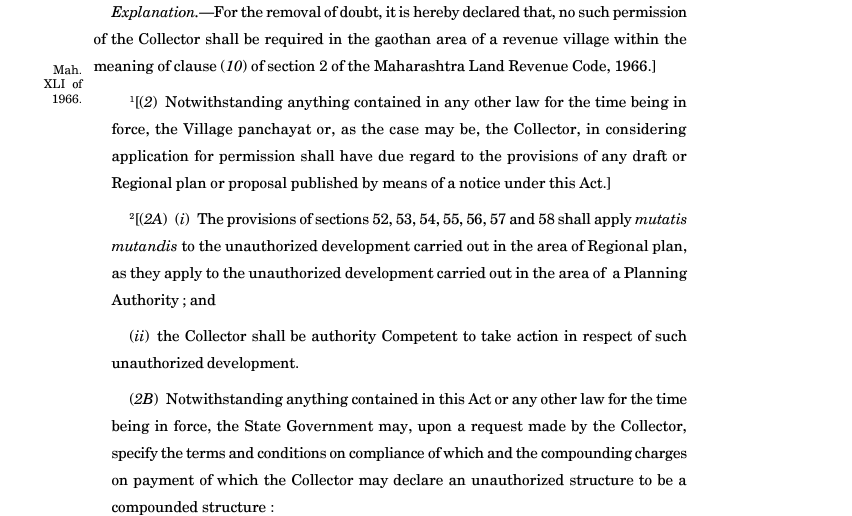
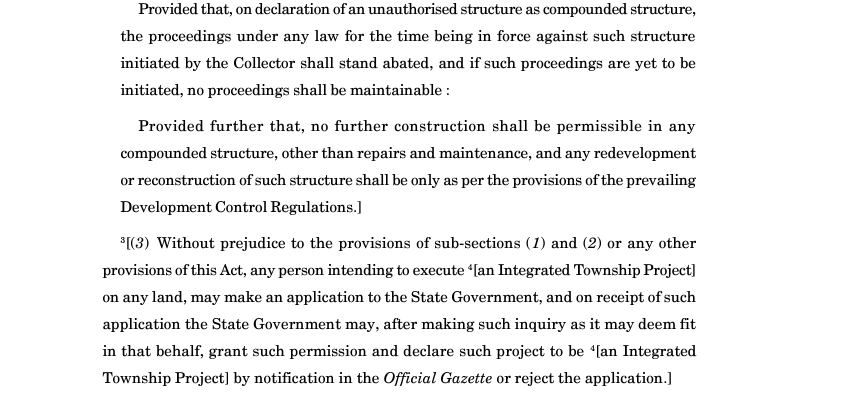
Section (1) of the Maharashtra Regional and Town Planning Act, 1966 states that no individual shall institute or modify the use of any land for non-agricultural purposes or conduct any development on the land without prior permission. The granting of permission depends on the location of the land. If it is within the limits of a Municipal Corporation, Municipal Council, Nagar Panchayat, Special Planning Authority, or any other planning authority, permission must be obtained from that specific authority. If it is situated in the gaothan area, as defined by clause (10) of section 2 of the Maharashtra Land Revenue Code, 1966, permission must be obtained from the village panchayat. If it is located in areas other than those mentioned in the previous clauses, permission must be obtained from the District Collector. The Collector may delegate their powers to an officer no lower than the rank of Tahsildar. The explanation clause clarifies that no permission of the Collector is required for the gaothan area of a revenue village.
Section (2) states that in considering an application for permission, the Village Panchayat or the Collector, as the case may be, must give due regard to any draft or Regional plan or proposal that has been published by notice under this Act. This is regardless of any other law currently in force.
Under section 2A, the same provisions that apply to unauthorized development in the area of a Planning Authority also apply to unauthorized development in the area of a Regional plan. The Collector has the authority to take action against unauthorized development in this area.
Section 2B allows the State Government to specify terms and conditions for compliance and compounding charges for unauthorized structures that the Collector may declare as compounded structures. Upon such a declaration, any proceedings initiated against the structure by the Collector will be abated. No further construction is allowed in a compounded structure except for repairs and maintenance, and any redevelopment or reconstruction must follow prevailing Development Control Regulations.
Section 3 allows individuals intending to execute an Integrated Township Project on any land to make an application to the State Government. After conducting an inquiry, the State Government may grant permission and declare the project as an Integrated Township Project through a notification in the Official Gazette, or reject the application. These provisions are in addition to the requirements of sub-sections 1 and 2, and any other provisions of the Act.
Permission from the Collector is not required for changing the use of Occupants – Class I land to any purpose mentioned in the authorized Development plan or draft Development plan under the Maharashtra Regional and Town Planning Act, 1966. However, the Planning Authority must verify the land’s class, occupancy, and any encumbrances with the revenue authority and subsequently grant development permission as per the Act’s provisions.
Section- 19. Exclusion of claims for compensation for injurious affection–
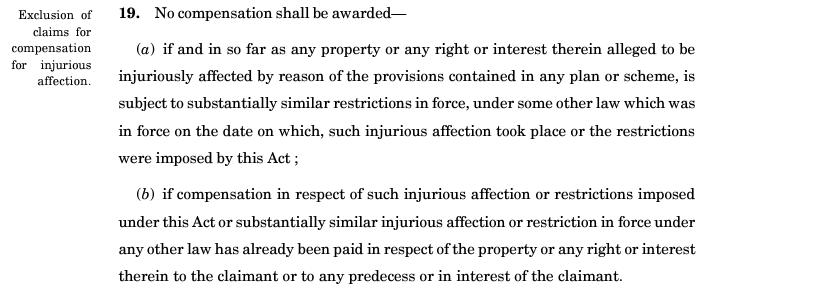
Section 19 of the Maharashtra Regional and Town Planning Act, 1966 pertains to the exclusion of claims for compensation for injurious affection. It states that no compensation shall be awarded in two specific situations:
(a) If the property or any right or interest therein that is alleged to be injuriously affected by the provisions contained in any plan or scheme, is subject to substantially similar restrictions under some other law which was in force on the date when such injurious affection took place or the restrictions were imposed by this Act. This means that if the property is already subject to similar restrictions under some other law, then the claimant cannot seek additional compensation under this Act.
According to section 19 of the Maharashtra Regional and Town Planning Act, 1966, no compensation will be awarded if the property, or any right or interest therein, claimed to be affected by a plan or scheme, is subject to substantially similar restrictions that were in force under some other law on the date when the injurious affection occurred or the restrictions were imposed by this Act. Additionally, if the claimant or any predecessor in interest has already received compensation for the injurious affection or restriction from this Act or another law that imposes substantially similar injurious affection or restriction, then they cannot seek additional compensation under this Act.
Essentially, this means that if the property or right was already subject to similar restrictions under another law, or if the claimant has already been compensated for the injurious affection or restriction from another law, then they cannot claim compensation again under this Act. This provision prevents claimants from receiving double compensation for the same injurious affection or restriction and ensures that compensation is fair and just.
Section- 20. [Revision or modification] of Regional Plan–
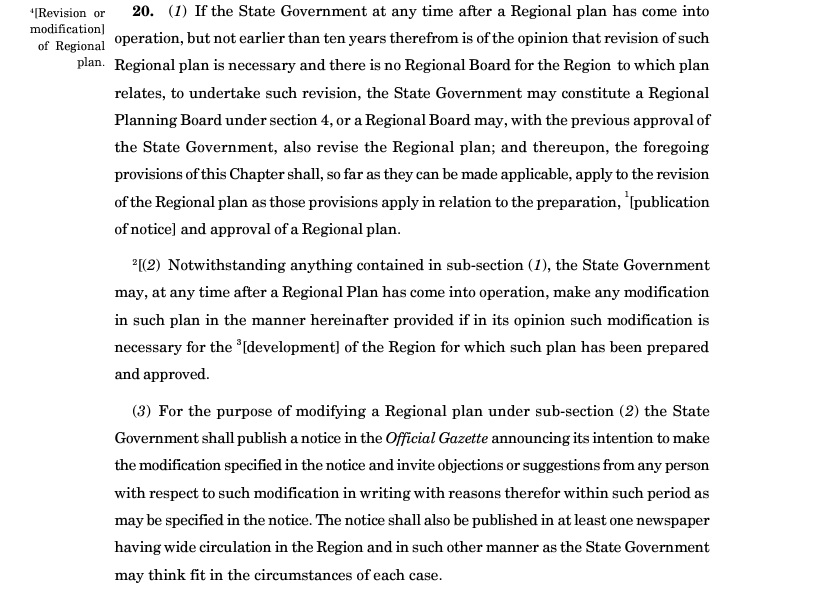

The section states that a Regional Plan can be revised or modified by the State Government if deemed necessary, and the procedures for doing so are outlined in this Chapter. If the State Government determines that a Regional Plan needs to be revised, and there is no existing Regional Board for the region, then the State Government may establish a Regional Planning Board under Section 4, or an existing Regional Board may revise the Plan with prior approval from the State Government.
The provisions in this Chapter regarding the preparation and approval of a Regional Plan shall apply to the revision of the Regional Plan, as far as they can be made applicable. This means that the same procedures and requirements that were followed when the initial Regional Plan was created will also apply to any revisions or modifications made to it.
In addition, the State Government may modify the Regional Plan at any time after it has come into operation, if it determines that such modification is necessary for the development of the region for which the Plan has been prepared and approved. However, the manner in which modifications can be made is outlined in the following sections of the Chapter.
In short, this section provides the State Government with the authority to revise or modify the Regional Plan as necessary to meet the evolving needs of the region. It also ensures that any such revisions or modifications are made through a transparent and standardized process, with appropriate public notice and approval requirements.
To modify a Regional Plan under subsection (2), the State Government must first publish a notice in the Official Gazette, declaring its intention to make the proposed modification and seeking objections or suggestions from anyone with respect to such modification. The notice must also be published in at least one widely circulated newspaper in the region and in any other manner that the State Government deems appropriate.
After receiving objections and suggestions regarding the draft modification, the State Government will review them and make any necessary amendments to the modification. The State Government will then approve or disapprove the proposed modification, and publish a notification in the Official Gazette indicating whether the modification has been approved with or without amendments, or not approved at all. If the modification is approved, the notification will also specify a date on which the modified plan will come into operation and indicate where a copy of the modification to the Regional Plan can be inspected during reasonable hours.
It is important to note that if a Regional Plan has been in operation for at least ten years and the State Government believes that it needs to be revised, it may either constitute a Regional Planning Board or give approval for the Regional Board to revise the plan. The provisions of this chapter will apply to the revision of the Regional Plan, similar to the preparation and approval of a new Regional Plan.
The excerpt is a statement by a court in the case of Chandula Motilal Talera & Ors. v. The State of Maharashtra & Ors., 2012(4) ALL MR 931. In this case, the court did not find any illegal actions on the part of the respondents (the State of Maharashtra and others) and, as a result, did not grant the writ petitions that were filed under Article 226 of the Constitution of India.
Article 226 of the Constitution of India empowers High Courts to issue writs, orders or directions to any authority or person to enforce fundamental rights or for any other purpose, if it is considered necessary. In this case, the writ petitions were filed by the petitioners seeking interference by the court to address an alleged illegality in the actions of the respondents. However, the court did not find any such illegality and therefore dismissed the writ petitions.